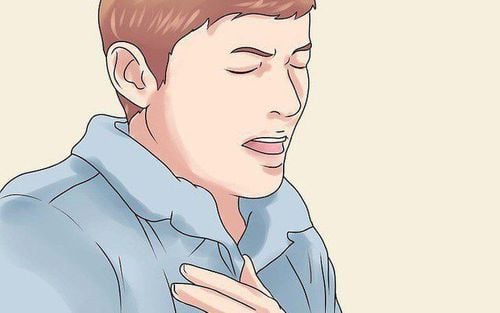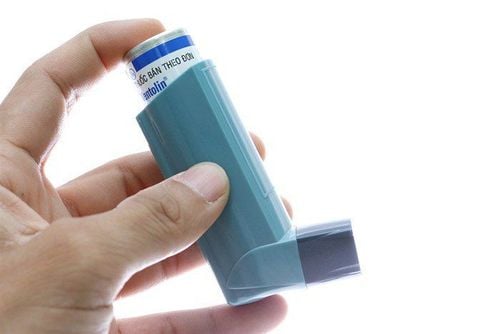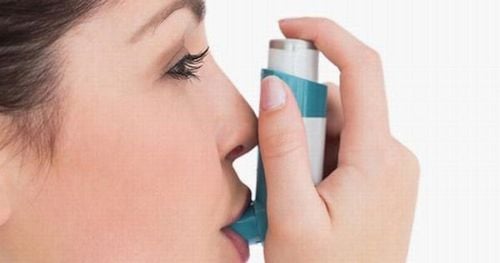This is an automatically translated article.
Asthma is a chronic disease with many different causes, so it is necessary to identify the symptoms as well as the causes of asthma in order to have a timely examination and treatment direction to avoid dangerous complications. happen.
1. Symptoms of Asthma
Asthma symptoms vary from person to person, some people have occasional asthma attacks and only show symptoms at certain times, for example during exercise, but there are some patients who always have to fight back. cope with persistent symptoms such as shortness of breath, chest pain, trouble sleeping due to shortness of breath, coughing or wheezing, a hiss or wheezing sound when exhaling, severe cough,...
Accordingly, the signs Signs that asthma is progressing include:
More frequent and uncomfortable asthma signs and symptoms Increased shortness of breath (can be checked with a peak expiratory flow meter, device). This helps to check how the lungs are working) More rapid-acting inhalers are required. For some patients, asthma signs and symptoms flare up in certain situations such as:
Exercise-induced asthma, which can be aggravated by cold and dry air Occupational asthma caused by irritants in the workplace, for example chemical fumes, gas or coal dust,... Allergic asthma, which is triggered by airborne substances, such as pollen, mold spores, cockroach waste or Pet skin particles and dry saliva (pet dander)

Bệnh nhân mắc hen suyễn thường xuyên cảm thấy khó thở
2. What is the cause of bronchial asthma?
Currently, the cause of bronchial asthma is still unknown, but according to research, the cause of bronchial asthma may be due to a combination of environmental factors and genetics.
2.1 Asthma Triggers Exposure to various irritants and allergens (allergens) can trigger the signs and symptoms of asthma. Everyone's asthma triggers are different and can include:
Airborne substances, such as pollen, dust mites, mold spores, pet dander or cockroach waste particles Infection breathing, such as the common cold Physical activity (exercise-induced asthma) Cold air Air pollutants and irritants, such as smoke Certain medications, including antidepressants beta, aspirin, ibuprofen (Advil, Motrin IB, others) and naproxen (Aleve) Strong emotions and stress Sulfites and preservatives are added to some foods and beverages, including shrimp, dried fruit , processed potatoes, beer and wine Gastroesophageal reflux disease (GERD), which is when stomach acid backs up into the airways 2.2 Risk factors Several factors are thought to increase your chances of getting the disease. asthma as follows:
Have a strong family history (such as a parent or sibling) with asthma The patient has another allergic condition, such as atopic dermatitis g or allergic rhinitis (hay fever) Being overweight Being a smoker Exposure to tobacco smoke Exposure to exhaust fumes or other types of pollution Exposure to occupational triggers, such as chemicals substances used in agriculture, hairdressing and manufacturing

Tiếp xúc với các loại khói thuốc làm tăng nguy cơ mắc bệnh hen suyễn
3. How to prevent asthma recurrence
Asthma affects quality of life, disrupts daily activities such as work or study, severe cases even requires hospitalization, so asthma patients need to pay attention to the following:
Adhere to the treatment plan. : Write a detailed plan for medication and asthma control based on your doctor's instructions. Asthma is an ongoing condition that requires regular monitoring and treatment. Get flu and pneumonia vaccines: Recommended vaccinations can prevent flu and pneumonia that trigger asthma attacks. Identify and avoid asthma triggers: Certain outdoor allergens and irritants – from pollen and molds to cold air and air pollution – can trigger asthma attacks. Find out what causes or worsens your asthma and takes steps to avoid those triggers. Monitor your breathing: Learn to recognize the warning signs of an impending asthma attack, such as a mild cough, wheezing, or shortness of breath. But because lung function can decline before a person notices any signs or symptoms, see a specialist regularly. Early recognition and treatment: If you act in time, asthma attacks are less likely to get worse, and you will not need to take many medications. When a reduced peak expiratory flow measurement indicates an impending asthma attack, take your medication as directed and immediately stop any activity that might trigger an asthma attack. If symptoms do not improve, call 911 immediately. Taking prescription drugs: You should not change or stop taking your medication without consulting your doctor. You should bring your medication with you to each visit, so your doctor can check that you are taking the correct dose. In addition, if you find yourself dependent on an incense inhaler such as albuterol, your asthma is not under control. See your doctor right away to adjust your treatment.
Asthma, if not diagnosed and strictly controlled, will cause many serious consequences such as acute and malignant dyspnea, even death. Therefore, when you see symptoms of the disease or have a family history of asthma, you need to consider screening for asthma at an early stage.
For advice and registration to book an appointment, customers can contact Vinmec hospitals and clinics nationwide HERE.
References: webmd.com, webmd.com, mayoclinic.org













